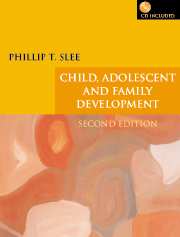Book contents
- Frontmatter
- Contents
- List of Trends and issues
- List of Family life-cycles
- List of Figures and Tables
- Note to the Student
- Note to the Instructor
- How to use the CD-ROM
- Acknowledgements
- Introduction
- Part 1 The Study of Human Development
- Part 2 Conception and Birth
- Part 3 Infancy
- 6 Physical Development in Infancy
- 7 Cognitive Development in Infancy
- 8 Social and Emotional Development in Infancy
- Part 4 Toddlerhood
- Part 5 The Pre-school Years
- Part 6 Middle Childhood
- Part 7 Adolescence
- Part 8 Studying Human Development
- Glossary
- References
- Index
- STUDENT FEEDBACK FORM
8 - Social and Emotional Development in Infancy
from Part 3 - Infancy
- Frontmatter
- Contents
- List of Trends and issues
- List of Family life-cycles
- List of Figures and Tables
- Note to the Student
- Note to the Instructor
- How to use the CD-ROM
- Acknowledgements
- Introduction
- Part 1 The Study of Human Development
- Part 2 Conception and Birth
- Part 3 Infancy
- 6 Physical Development in Infancy
- 7 Cognitive Development in Infancy
- 8 Social and Emotional Development in Infancy
- Part 4 Toddlerhood
- Part 5 The Pre-school Years
- Part 6 Middle Childhood
- Part 7 Adolescence
- Part 8 Studying Human Development
- Glossary
- References
- Index
- STUDENT FEEDBACK FORM
Summary
One Must Look with the Heart
‘The men where you live’, said the little prince, ‘raise five thousand roses in the same garden – and they do not find in it what they are looking for’.
‘They do not find it,’ I replied.
‘And yet what they are looking for could be found in a single rose, or in a little water’.
‘Yes, that is true,’ I said.
And the little prince added:
‘But the eyes are blind. One must look with the heart’.
Antoine de Saint-Exupéry, The Little PrinceKEY TERMS AND CONCEPTS
Libido
Cathexis
Trust versus mistrust
Conditioning of emotions
Nativist
Cognitive/constructionist
Attachment
Temperament
Introduction
Parents have long known, and child development researchers are coming to better understand the rich and complex emotional and social experience of the young child. Historically, researchers' understanding of the parent–infant socio-emotional relationship has undergone considerable transformation in the last century. The major changes that have taken place are:
a greater understanding of the extent of the infant's socioemotional capabilities;
the view of the infant as an active participant in the development of his or her capabilities;
a greater appreciation of individual differences between infants.
In this chapter consideration will be given to various theoretical views of infant socio-emotional development, the nature of emotions, attachment and infant temperament. The Family Lifecycle: 8 discusses a woman's preparation for motherhood.
Theoretical foundations
An examination of some basic theoretical perspectives as proposed by Freud and Erikson will provide a foundation for understanding the quantum shifts in thinking which have occurred regarding the nature of social/emotional development in infancy.
- Type
- Chapter
- Information
- Child, Adolescent and Family Development , pp. 160 - 180Publisher: Cambridge University PressPrint publication year: 2002



